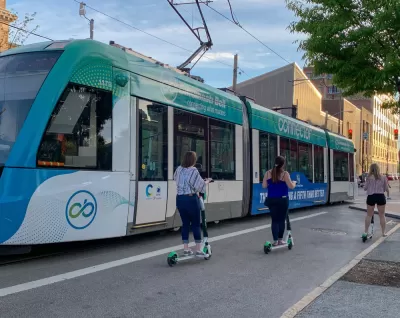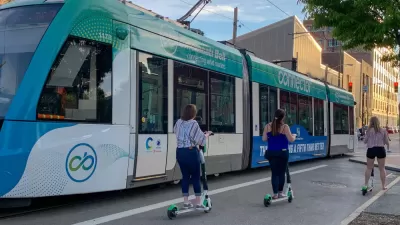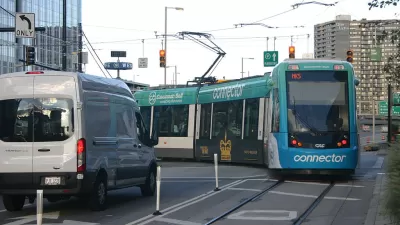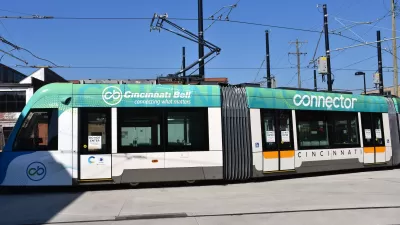The Cincinnati Bell Connector has been offering free rides since reopening in October, but the Cincinnati City Council recently decided to make the free rides a permanent feature.

"Since reopening after a pandemic-related suspension, Cincinnati's streetcar has not charged fares for passengers to ride. Starting [November 1], that change will become permanent," reports Pat LaFleur.
The free ride rely on a fare-free operations structure first implemented as a 60-day measure in September, according to LaFleur. In addition to the benefits of free rides, streetcar riders are also expected to benefit from improved service performance, as the time for paying fare has been removed from the boarding equation.
"Given the pandemic-related, months-long streetcar shutdown, and now having operated fare-free for the last two months, recent data regarding how much fare revenue the streetcar collected on a daily basis is scarce and unreliable," writes LaFleur. "In a May 2019 memo, then-City Manager Patrick Duhaney estimated that the Connector had brought in roughly $330,000 in fares in 2018, but the cost to collect those fares -- including printing the tickets, maintaining the ticket vending machines and paying fare inspectors -- offset that revenue by nearly $260,000."
The article also includes details of Mayor John Cranley's counter proposal, which failed to gain the political traction over the fare-free idea.
FULL STORY: Cincinnati streetcar will go fare-free permanently starting Nov. 1

Planetizen Federal Action Tracker
A weekly monitor of how Trump’s orders and actions are impacting planners and planning in America.

Maui's Vacation Rental Debate Turns Ugly
Verbal attacks, misinformation campaigns and fistfights plague a high-stakes debate to convert thousands of vacation rentals into long-term housing.

Restaurant Patios Were a Pandemic Win — Why Were They so Hard to Keep?
Social distancing requirements and changes in travel patterns prompted cities to pilot new uses for street and sidewalk space. Then it got complicated.

In California Battle of Housing vs. Environment, Housing Just Won
A new state law significantly limits the power of CEQA, an environmental review law that served as a powerful tool for blocking new development.

Boulder Eliminates Parking Minimums Citywide
Officials estimate the cost of building a single underground parking space at up to $100,000.

Orange County, Florida Adopts Largest US “Sprawl Repair” Code
The ‘Orange Code’ seeks to rectify decades of sprawl-inducing, car-oriented development.
Urban Design for Planners 1: Software Tools
This six-course series explores essential urban design concepts using open source software and equips planners with the tools they need to participate fully in the urban design process.
Planning for Universal Design
Learn the tools for implementing Universal Design in planning regulations.
Heyer Gruel & Associates PA
JM Goldson LLC
Custer County Colorado
City of Camden Redevelopment Agency
City of Astoria
Transportation Research & Education Center (TREC) at Portland State University
Jefferson Parish Government
Camden Redevelopment Agency
City of Claremont





























